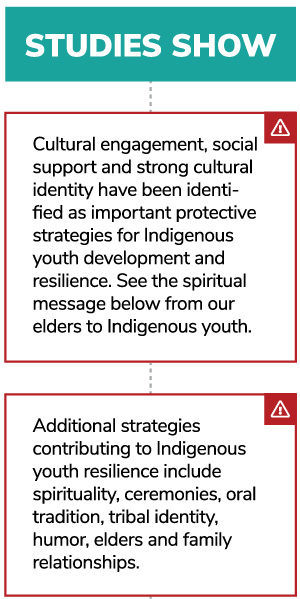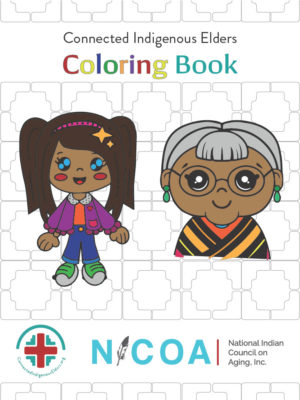For Youth
 As Indigenous people, we value our language, culture, our communities, our clans, and families, which includes our elders. We believe that everything and everyone is connected. Our elders teach us about ourselves and how to honor, show gratitude and respect, and how to love. Youth have a responsibility as well to take care of our elders.
As Indigenous people, we value our language, culture, our communities, our clans, and families, which includes our elders. We believe that everything and everyone is connected. Our elders teach us about ourselves and how to honor, show gratitude and respect, and how to love. Youth have a responsibility as well to take care of our elders.
The National Indian Council on Aging (NICOA) reminds youth of their obligation and responsibility to their families, as well as their elders, family members or clan or community members. Youth can play a part in ensuring that our elders aren’t socially isolated or lonely.
How to Keep Elders from Being Lonely or Socially Isolated
- Ask them to share their cultural knowledge – Many of our elders have knowledge of our languages cooking, crafts, medicinal plants and so much more.
- Frequent visits – Saying hello or asking if an elder needs something, such as food, medicine or tasks done around the house, such as wood chopping, weed pulling or repairs will help him or her feel connected to community.
- Consistent contact – Call often or use an app such as Facetime, Zoom or Skype, or social media, such as Facebook, to place a video call.
- Record their stories – Elders have so much knowledge from creation stories to family histories. Recording these stories will help keep their voices and spirits alive.
- Teach your elder how to use digital tools – Teach them use of cell phones, computers, iPads, tablets, and social media so they can keep in contact with you, find resources about social isolation or join a Facebook group to keep from feeling lonely.
- Transportation – Provide transportation to the post office, grocery store, or the pharmacy to ensure that they are continuing to live independent dignified lives.
We have created a coloring book to give youth ideas on how to help their elders keep from becoming socially isolated or lonely. The book is part of our Connected Indigenous Elders campaign and is available for download.
A big thank you to our artists, Vanessa Bowen (@thevanessabowen), Leah Lewis (@nsrgnts), Damon Begay (@day_day_mon), and our youth artists, Kaydence M. Riley (@SantaFeIndianSchool), and Zaiera Moquino (@santafeprep).
There are so many ways to show love to our elders. The National Indigenous Elder Justice Initiative has made a poster of How to Love Your Elders. Read our blog about ways to connect with elders and download a poster.
Spiritual Message from the Elders to the Youth
Our elders also think about the importance of Indigenous youth. Our membership created a spiritual message to America at the 2000 conference in Duluth, Minnesota. More than 1,200 elders from 105 tribes across Native America came together so that everyone, including youth and children could share words of wisdom to help throughout our lives. Please forward and pass this message to as many people as you can, both Native and non-Native.
As we stand before the dawn of a new millennium, we pray for America’s survival, our survival.
We pray that we will be given strength by the Creator to follow the footsteps of our forefathers to share our love, respect and compassion for one another. There is good in everyone because our Creator has put a little of Himself in all of us.
We pray for forgiveness for the pain and suffering we have caused one another.
We pray that our children will not repeat our mistakes.
We pray that we can respect the diversity of America; all life is sacred. Every child born is a precious gift of our Creator. It is our sacred trust to embrace children from all walks of life because we are part of the same family.
We pray that children will honor and respect their elders — that is where the wisdom comes from. This respect will not allow forgotten elders. We are all equal, with each having our own special gift to contribute. These values allow our youth to become leaders and workers in our society. Children, you are our future and our hope for the people. Stand and be courageous.
We pray to learn and use the wisdom of all that has come before us, to achieve personal successes and to contribute to those of others. Only when our young ones learn respect for everything can they evolve.
Resources:
Youth and Engaging Elder programs
Native Youth Today: Bridging the Gap Between Traditional and Modern Day Practices:
UNITY – United National Indian Tribal Youth:
Aging Plan: My Aging Plan or MAP helps everyone identify and assess key factors as they age, such as finances, health, housing and plan for those stages in life. It’s never too late to start planning for our future. https://seniorcitizens.westchestergov.com/images/stories/pdfs/2018map.pdf
